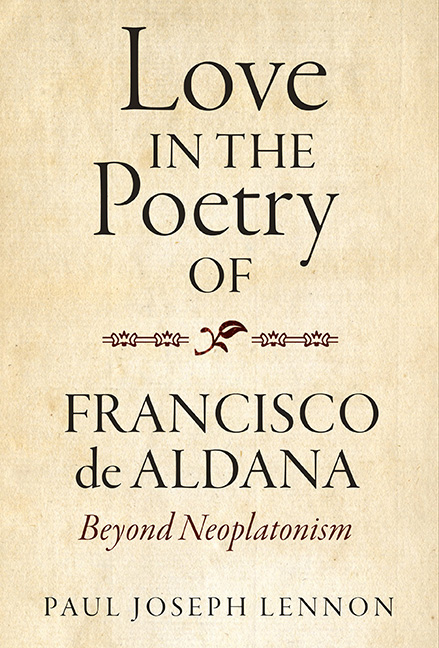2 - The Temerity to Love
Published online by Cambridge University Press: 15 October 2019
Summary
Aldana's poetic response with respect to love was to synthesise a variety of existing philosophies – both classical and contemporary – so as to arrive at something distinct from what Spain had to offer at the time, which was probably the result of his upbringing and education beyond the mainland. We saw in the previous chapter how Petrarchism was appropriated and mobilised as the vanguard for the dissemination of Neoplatonic thought in the period. The use of Petrarchism as a vector is of interest regarding Aldana's approach and informs the analyses contained both in this chapter and this study as a whole. Centred on one of his longer poetic texts, ‘Pues tan piadosa luz de estrella amiga’, this chapter also incorporates philosophical and consolatio material from elsewhere in Aldana's corpus to ensure the requisite breadth and cohesion. In order to highlight Aldana's innovation, I will continue to make use of contemporary Spanish poetry as well as treatises on love to give context to both the period and literary landscape in which Aldana wrote. Additionally, in acknowledging the time as one of flux when the most pertinent theoretical veins showed imbrication, an assessment of Aldana's interaction with these areas of overlap will also be of concern to us.
The poems selected for analysis at this juncture present routinely deployed tropes and topoi that are subject to slippage with respect to their most common literary connotations. By slippage, I mean the space generated by the poet in the mind of the reader as a result of the differences between the original commonplace and its apparent function when redeployed in another (con)text. These gaps help generate incremental movement away from the traditional connotation at the textual level via the paradoxical exploitation of the safety of existing poetic models. For example, as the reader progresses through the (macro)text, the repeated incremental slippages interlink to generate momentum that distances the commonplaces from their original significations and encourages the reader to synthesise new meanings based on the combined effects of the iterative shifts and the new poetic contexts in which they are found. The outcome is that the commonplace is deemed not to be what it prima facie appears. Such consolidation is the fruit of time spent by the reader reflecting upon their experience of a series of poems as a whole.
- Type
- Chapter
- Information
- Love in the Poetry of Francisco de AldanaBeyond Neoplatonism, pp. 49 - 88Publisher: Boydell & BrewerPrint publication year: 2019



